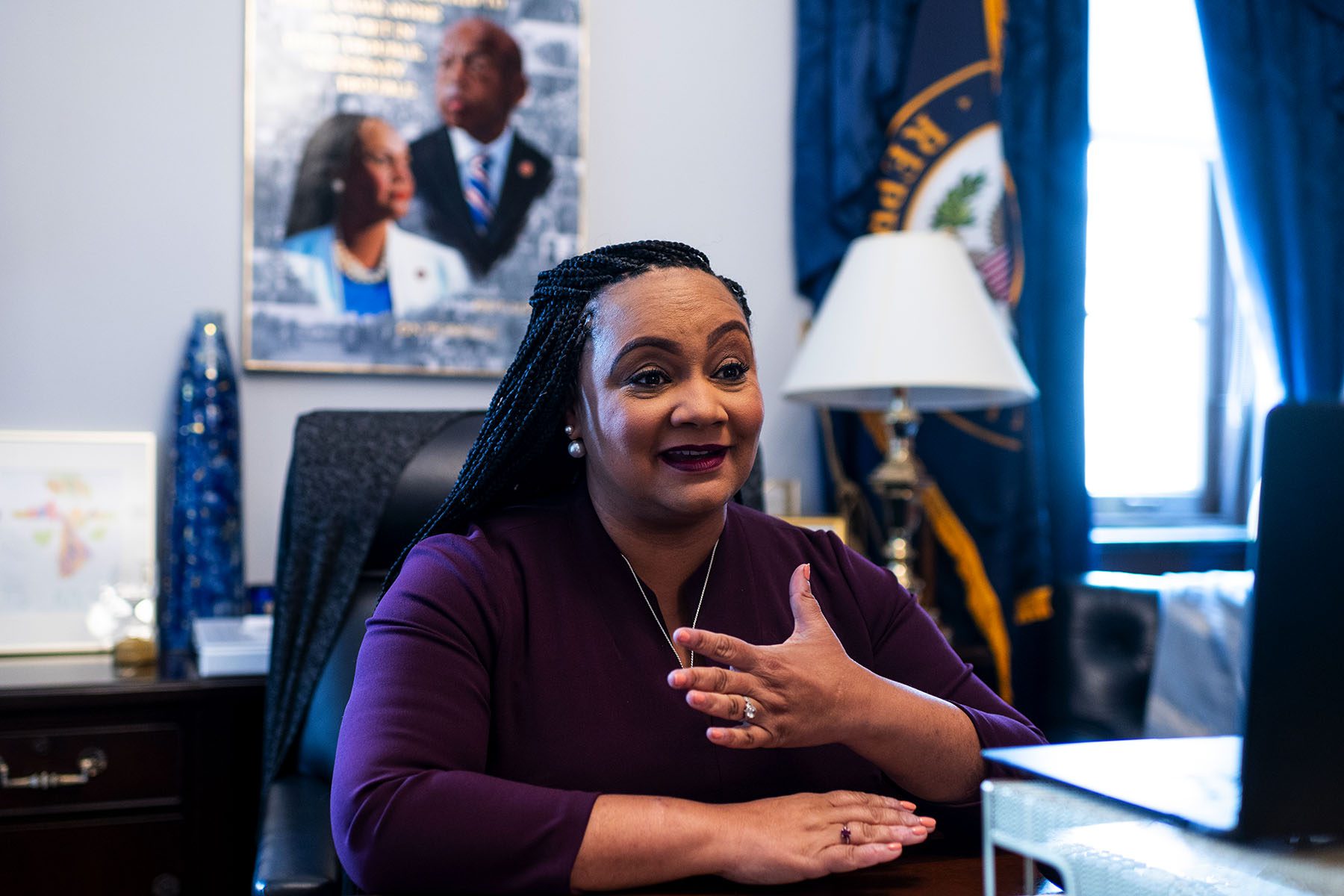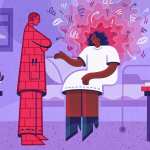Nikema Williams was a young teen just beginning her menstrual cycle when she began experiencing sharp pain in her pelvic region so severe that some days she had to stay home from school.
At the time, Williams, who is now a member of Congress, didn’t have the words to truly describe her pain. “I can now say, because I’ve been through childbirth, my labor pains were not as extreme as the pain that I would have every month with endometriosis,” Williams told The 19th.
Williams said she remembers one doctor asking her mother whether she was exaggerating. Another doctor suggested that Williams could get a hysterectomy as a way to address the pain.
It wasn’t until Williams’s third doctor and a surgical procedure that she learned conclusively at age 14 that she had endometriosis, a condition where tissue that mimics the lining that grows inside a uterus instead grows elsewhere. The tissue can attach to nerves or other internal organs like fallopian tubes or ovaries, causing debilitating pain. It can lead to heavy bleeding during and between menstrual periods. People with endometriosis are also more likely to have challenges with infertility.
Like Williams, many people with endometriosis face doubt from medical professionals and spend years without knowing what is wrong. That reality prompted Williams, along with Rep. Jenniffer González-Colón, Puerto Rico’s nonvoting member of Congress, to relaunch the Congressional Endometriosis Caucus this week.
“So many people are still suffering without even knowing what they have or knowing that they should ask their doctor to check to see if they have endometriosis,” Williams said. “I think we see this in a lot of things when we’re dealing with our reproductive system with women and doctors.”
The caucus, which currently has 31 members in both major parties, seeks to raise awareness, improve research and promote equitable medical care for the condition. The caucus was first started in 2020 by González-Colón and then-Democratic Rep. Abby Finkenauer, after Finkenauer shared her personal experience with the disease on the House floor. The group went dormant after Finkenauer lost her 2020 re-election bid.
During a virtual relaunch event for the caucus on Tuesday, speakers including Williams and González-Colón spoke about the wide-ranging effects of endometriosis.
“I was first diagnosed in 2016 at nearly 33 years old after I experienced what had to be the worst pain of my life,” said Diana Falzone, a journalist and ambassador for the Endometriosis Foundation. “It felt like a piece of hot coal was being dragged down the side of my abdomen. I had bleeding outside of my normal menstrual cycle, a low grade fever, nausea.”
An estimated 7 million women in the United States, and 200 million worldwide, deal with endometriosis. It also affects transgender and gender-diverse people. People who deal with significant bouts of pain may be forced to miss out on work or school. This includes Williams as a sitting congress member; during the relaunch event she said she recently had to find another lawmaker to vote for her by proxy because endometriosis pain left her unable to attend proceedings in the House chamber.
People may also suffer from mental health challenges as a result of the pain and stress. Experts estimate that endometriosis costs about $78 billion per year in health care expenditures and lost productivity.
A 2019 paper led by a University of Michigan researcher, Dr. Sawsan As-Sanie, indicated that minimal investment in endometriosis has limited our understanding of the disease and slowed innovation on diagnostic and treatment options.
A key step to adequate treatment for the pain is first being diagnosed. Many people will see four to seven health care providers and wait seven to 10 years before receiving an official diagnosis, Dr. Soyini Hawkins, a minimally invasive gynecologic surgeon, said at the virtual launch event for the Endometriosis Caucus.
Part of the diagnosis difficulty arises because endometriosis is what’s known as a “diagnosis of exclusion,” Hawkins said, which means it is diagnosed after first eliminating other possible causes of the symptoms. The only way to truly confirm the diagnosis is through a surgical biopsy.
Cutting down that long diagnostic time starts with medical professionals believing people who talk about their pain, said Heather Guidone, the surgical program director of the Center for Endometriosis Care. Research across multiple medical specializations indicates that women who complain to doctors about pain are less likely than men to be believed or taken seriously, which can result in misdiagnosis or delays in the proper treatment. This disparity is even more pronounced for Black women. Gender diverse people face a host of challenges when seeking medical treatment, including mistreatment by doctors and prohibitive costs. Additionally, the outdated association between endometriosis and White women means that people who do not fit this description may be overlooked during diagnosis, Guidone said.
Having a narrow view of who an endometriosis patient is means that “anybody who doesn’t fit into that little pigeonhole box really has to fight doubly hard to get care within that traditionally, White female-identified space,” she added.
After diagnosis, determining the appropriate treatment is vital. Many treatments now involve masking the pain and may not address the root of the problem, Williams said. Other procedures used for people with endometriosis, like hysterectomies, are invasive and potentially life-altering. While they may reduce endometriosis symptoms, they may not stop them completely.
This is why increased funding for research into other potential treatments is key, Williams said. For 2021 Congress doubled its investment in endometriosis funding, to $26 million. Williams said that one of the first orders of business for the Endometriosis Caucus is to push for at least the same amount to be appropriated for 2022.
These efforts intend to be inclusive of all people who experience endometriosis, Williams said.
Guidone said she believes much of the legislative work up to this point has been more performative than productive. She has seen progress in recent years, she added, and she is hopeful lawmakers will not only continue to call for research funds, but will also prioritize menstrual and endometriosis education programs.
“It helps patients know and understand how, when, where and why something is wrong and how to get help. It helps individuals know when their symptoms are real,” she said. “Education is always critical to body knowledge and bodily autonomy and empowerment.”






